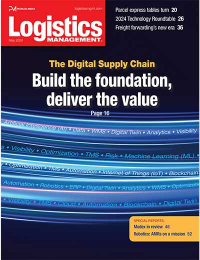Global Logistics: IWLA Concerned About Teamsters
Latest Logistics News
STB Chairman Martin J. Oberman retires LM reader survey drives home the ongoing rise of U.S.-Mexico cross-border trade and nearshoring activity USPS cites continued progress in fiscal second quarter earnings despite recording another net loss U.S. rail carload and intermodal volumes are mixed, for week ending May 4, reports AAR New Ryder analysis takes a close look at obstacles in converting to electric vehicles More NewsOAKLAND—The International Warehouse Logistics Association is urging Congress to reject legislative language that would weaken federal preemption of state and local regulation of trucking in the nation’s ports because it is a backdoor attempt to drive independent owner-operator truckers out of business at those locations – including at the Port of Oakland.
In a recent letter to Peter DeFazio (D-OR), chairman, and John J. Duncan Jr. (R-TN), ranking minority member of the House on Transportation & Infrastructure Committee Subcommittee on Highways and Transit, IWLA President Joel D. Anderson said proposed amendments to the Federal Aviation Administration Authorization Act would undermine federal preemption by allowing local governments to regulate port trucking when it comes to address environmental and port security matters.
“The proposed amendments are not really about environmental and security concerns at the nation’s ports,” Anderson said in his letter. “They are an attempt to gain through legislation what the courts have found to be unlawful: local regulation of truck drayage services at the nation’s ports. Specifically, the proposed amendments are designed to allow the ports to ban independent owner-operators in favor of employee drivers.”
Current federal law preempts state and local regulation of trucking in interstate and foreign commerce except in regard to safety. The proposed amendments would undermine federal preemption by granting local governments the authority to regulate the port trucking industry to address environmental and port security matters.
Proponents of the amendment improperly characterize the need for change as necessary to improve air quality and port security. Several major U.S. ports, including the Ports of Los Angeles, Long Beach and Seattle, have already initiated very successful Clean Truck Programs, Anderson pointed out to the subcommittee leaders. He cited the example of the California Air Resources Board which, in conjunction with the South Coast Air Quality Management District, implemented a clean trucks program that led to an estimated 80 percent reduction in diesel emissions two years ahead of its target date.
“This occurred without changing federal law,” Anderson noted. “This and similar efforts underway at other major U.S. ports demonstrate that it is not necessary to rewrite longstanding federal trucking laws to accomplish significant environmental improvements in port areas.”

Article Topics
Latest in Logistics
Automate and Accelerate: Replacing Pick-to-Light with the Next Generation of Automation STB Chairman Martin J. Oberman retires LM reader survey drives home the ongoing rise of U.S.-Mexico cross-border trade and nearshoring activity A buying guide to outsourcing transportation management SKU vs. Item-level Data Visibility: Why it Matters for End-to-End Traceability Key benefits of being an Amazon Business customer with Business Prime USPS cites continued progress in fiscal second quarter earnings despite recording another net loss More LogisticsAbout the Author
Subscribe to Logistics Management Magazine

Find out what the world's most innovative companies are doing to improve productivity in their plants and distribution centers.
Start your FREE subscription today.
May 2024 Logistics Management

Latest Resources














